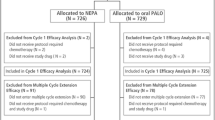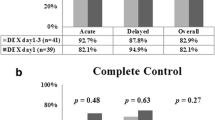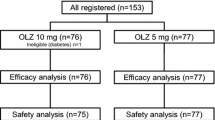Summary
A single centre double-blind randomised study was performed to determine the comparative efficacy and tolerability of a new antiemetic agent, navoban (ICS 205-930). 115 patients with malignant disease, who had not previously received chemotherapy, were randomly allocated to 2 groups, and received either navoban (n = 58) or a standard antiemetic treatment of dexamethasone plus metoclopramide (n = 57). Within the first 24 hours after receiving cisplatin-based chemotherapy, 76% of patients in the navoban group remained free of vomiting (with 59% of patients free of nausea) compared with 39% of patients free of vomiting in the conventionally treated group (30% of patients free of nausea). Improved control of emesis was also observed over 4 consecutive days of follow-up in the navoban group. The difference in incidence of nausea and vomiting between the patient groups was statistically significant (p < 0.05). The antiemetic activity of navoban in patients receiving cisplatin in a dosage of > 100 mg/m2 was comparable with patients receiving cisplatin < 100 mg/m2. A significantly lower intensity of adverse events was seen in the navoban group. Headache and constipation were more common with navoban, while extrapyramidal symptoms and somnolence as well as hypotonia were more frequent in the standard treatment group. The efficacy and tolerability of navoban was maintained over the consecutive chemotherapy cycle. The incidence of adverse events did not increase with repeated cycles of treatment, nor were they consistently repeated by the same patients in additional cycles. Thus, navoban appears to be an effective and well-tolerated antiemetic agent for use in patients receiving cisplatin-based chemotherapy.
Similar content being viewed by others
References
Bateman DN, Darling WM, et al. Extrapyramidal reaction to metoclopramide and prochlorperazine. Quarterly Journal of Medicine 71: 307–311, 1989
Bleiberg H, Van Belle S, et al. Compassionate use of a 5-HT3-receptor antagonist, tropisetron, in patients refractory to standard antiemetic treatment. Drugs 43(Suppl. 3): 27–32, 1992
Bruijn KM. Tropisetron: a review of the clinical experience. Drugs 43(Suppl. 3): 11–22, 1992
Gralla RJ, et al. Anti-emetic efficacy of high-dose metoclopramide: randomized trials with placebo and prochlorperazine in patients with chemotherapy-induced nausea and vomiting. New England Journal of Medicine 305: 905–909, 1981
Gralla RJ, Tyson LB, Kris MG, et al. The management of chemotherapy-induced nausea and vomiting. Medical Clinics of North America 71: 289–301, 1987
Kris MG, Gralla RJ, et al. Incidence, course, and severity of delayed nausea and vomiting following the administration of high-dose cisplatin. Journal of Clinical Oncology 3: 1379–1384, 1985a
Leibundgut U, Lancranjan J. First results with ICS 205-930 (5-HT3 receptor antagonist) in prevention of chemotherapy-induced emesis. Lancet 1: 1198, 1987
Madej G, et al. A randomized study comparing the efficacy of navoban (5HT-3 receptor antagonist) versus dexamethasone plus metoclopramide in the prevention and treatment of chemotherapy-induced emesis. A preliminary report. Nowotwory 43: 272–279, 1992
Miner WD, Sanger GJ. Inhibition of cisplatin-induced vomiting by selective 5-hydroxytryptamine M-receptor antagonism. British Journal of Clinical Pharmacology 88: 497, 1986
Sobkowski W, Jassem J. Metoclopramide and dexamethasone in the prevention of chemotherapy related emesis. Polski Tygodnik Lekarski 42: 841–843, 1987
Author information
Authors and Affiliations
Rights and permissions
About this article
Cite this article
Madej, G., Krzakowski, M., Pawiriski, A. et al. A Comparative Study of the Use of Navoban (ICS 205-930), a 5-HT3 Antagonist, versus a Standard Antiemetic Regimen of Dexamethasone and Metoclopramide in the Treatment of Cisplatin-Containing Chemotherapy. Drug Invest. 6, 162–169 (1993). https://doi.org/10.1007/BF03259737
Published:
Issue Date:
DOI: https://doi.org/10.1007/BF03259737




